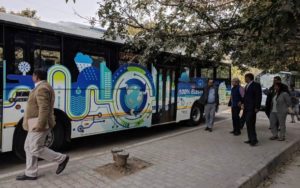Dehradun, the largest city in the northern state of Uttarakhand, India, becomes the fifth city in India to join the BreatheLife campaign. Governed by Dehradun Municipal Corporation, the city has launched a broad initiative to understand and address sources of air pollution, aligning these activities with economic development plans.
Dehradun city is placing restrictions on waste burning and is plans to reduce air pollution by making improvements to the transport and waste management systems, and promoting the use of clean household fuels and technologies. By building awareness among the general public, combined with a robust Dehradun City Air Action Plan the city hopes to address a growing problem of air pollution in Indian cities.
The Air Action Plan calls for strengthening the city’s capacity for air quality management across relevant departments and stakeholders including strengthening air quality monitoring, an emissions inventory and conducting a source apportionment study with Uttarakhand Pollution Control Board.

Plans are underway to address pollution from transport in the city by empowering traffic agents to check and levy fines against the owners of the worst polluting vehicles, phase out older commercial diesel vehicles and launch an enforcement and public awareness campaign to curb idling in hot-spots around the city. A Smart Traffic Management system is being introduced to monitor and provide data for decongestion strategies. Public transit is also being improved in a phased approach, with the introduction of CNG buses and a testing program for electric buses underway.
The city plans to increase the number of pedestrian walkways, making it safer to walk and encouraging physical activity. Additionally, green spaces along walkways, schools, community spaces and urban forests are envisioned to create “green lungs” for the city.
The city also plans to promote LPG connections as a transitional fuel for cooking and is prioritizing replacing wood and other polluting fuels used for household fuel. Cleaner fuel and technologies for commercial purposes like local Dhaba/eateries will also be promoted.
LPG connections are being provided by the Government under UJJAWALA scheme, with the city is working to ensure 100% implementation. Improving distribution of LPG through common pipeline with metering has already started in some metro areas in the state of Uttarakhand, replacing firewood and biomass burning for household cooking, and more efficiently distributing LGP than canisters. This has a secondary effect of reducing the number of transportation of vehicles needed. Improvements to housing are also being made through the Smart City program.
 Dehradun city aims to become a Center of Excellence on Air Quality by pooling technical expertise in the city and working with the Uttarakhand Pollution Control Board to undertake rigorous air quality research and implement a bold air quality action plan.
Dehradun city aims to become a Center of Excellence on Air Quality by pooling technical expertise in the city and working with the Uttarakhand Pollution Control Board to undertake rigorous air quality research and implement a bold air quality action plan.
Changes to waste management system are planned with restrictions on open burning of municipal solid waste, Biomass, plastic, horticulture waste etc. and improvements to transportation of municipal solid wastes, construction materials and debris in covered system to reduce dust. A fine of Rs 5,000 for open burning of waste has been introduced to discourage illegal dumping and burning, a key quality of life issue in the city.
Hero image © Ministry of AYUSH via wikimedia; Dehradun view © Vasu Pokhriyal via Wikimedia